A Critical Analysis of Unilever's International Marketing Strategies
VerifiedAdded on 2023/01/04
|6
|1503
|47
Report
AI Summary
This report provides an in-depth analysis of Unilever's international marketing strategies, focusing on its market focus, product and service offerings, and the reasons behind its international marketing strategy development. It examines Unilever's differentiation strategy, which involves adapting products to meet local market needs. The report also explores the key decision-making processes related to standardizing products and services to align with local market requirements, including the use of market research and digital marketing tools. The report highlights the challenges of international marketing and the importance of adapting to consumer behavior in different regions. The conclusion summarizes the effectiveness of standardization and adaptation in marketing and promotional plans, with references to relevant academic sources.
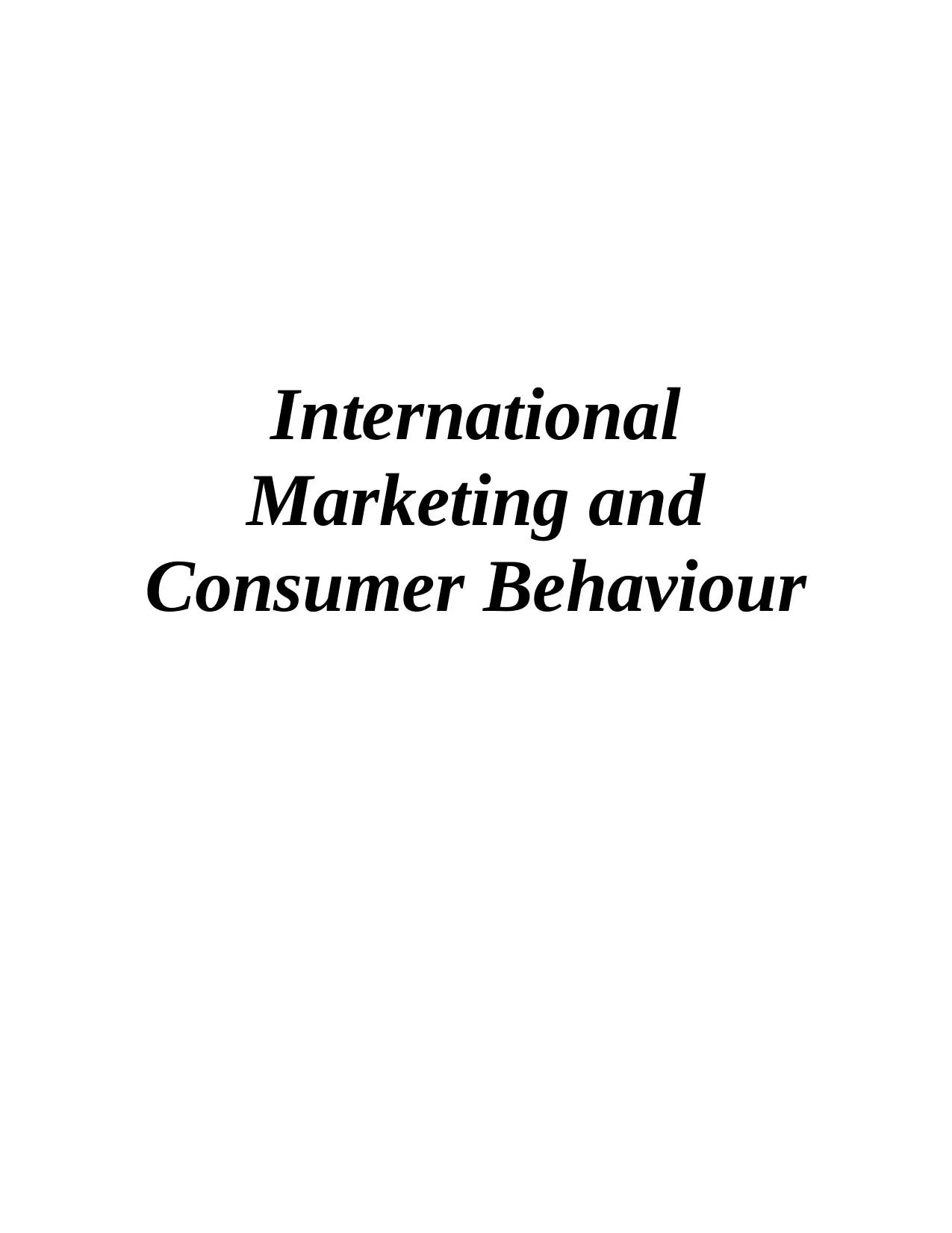
International
Marketing and
Consumer Behaviour
Marketing and
Consumer Behaviour
Paraphrase This Document
Need a fresh take? Get an instant paraphrase of this document with our AI Paraphraser
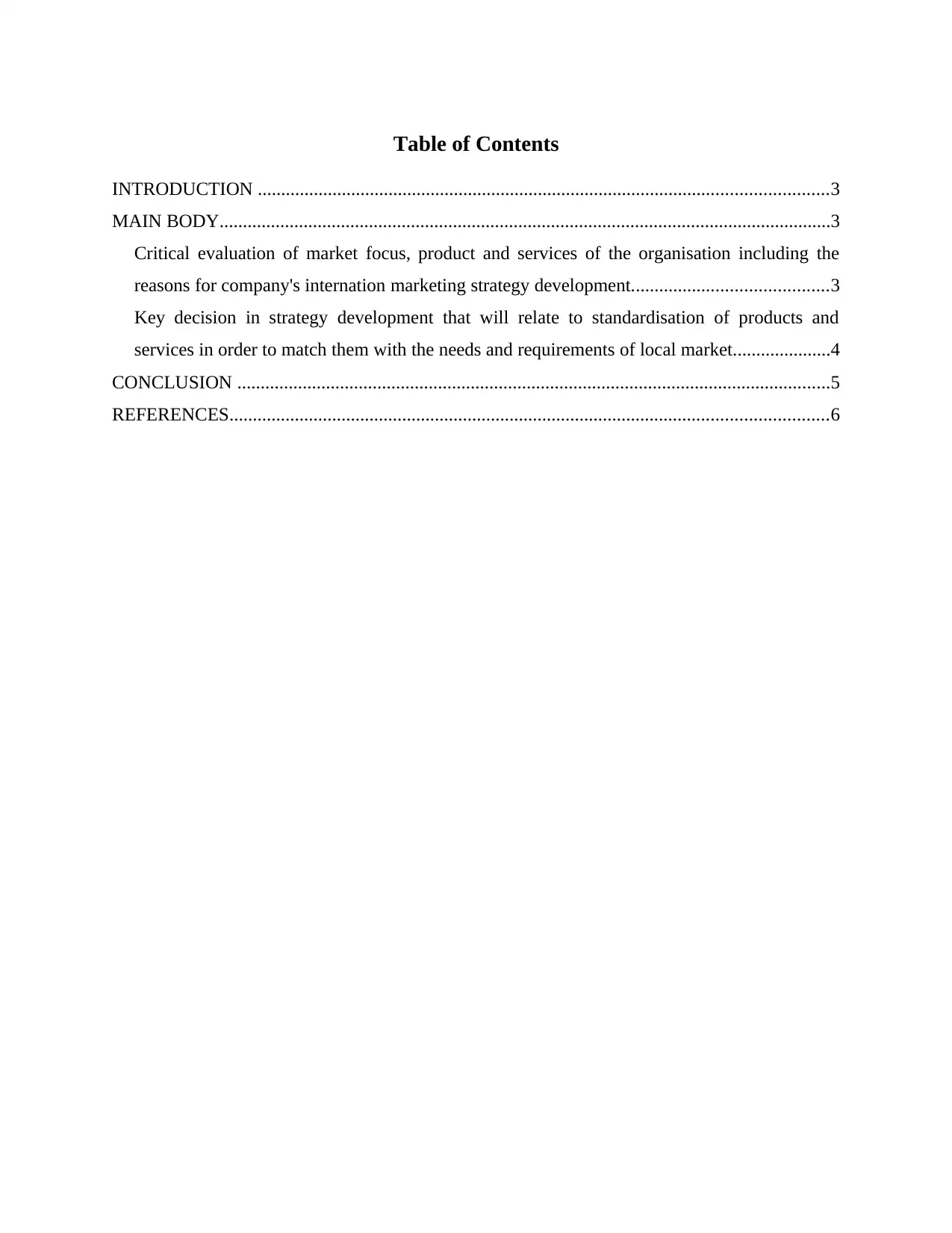
Table of Contents
INTRODUCTION ..........................................................................................................................3
MAIN BODY...................................................................................................................................3
Critical evaluation of market focus, product and services of the organisation including the
reasons for company's internation marketing strategy development..........................................3
Key decision in strategy development that will relate to standardisation of products and
services in order to match them with the needs and requirements of local market.....................4
CONCLUSION ...............................................................................................................................5
REFERENCES................................................................................................................................6
INTRODUCTION ..........................................................................................................................3
MAIN BODY...................................................................................................................................3
Critical evaluation of market focus, product and services of the organisation including the
reasons for company's internation marketing strategy development..........................................3
Key decision in strategy development that will relate to standardisation of products and
services in order to match them with the needs and requirements of local market.....................4
CONCLUSION ...............................................................................................................................5
REFERENCES................................................................................................................................6
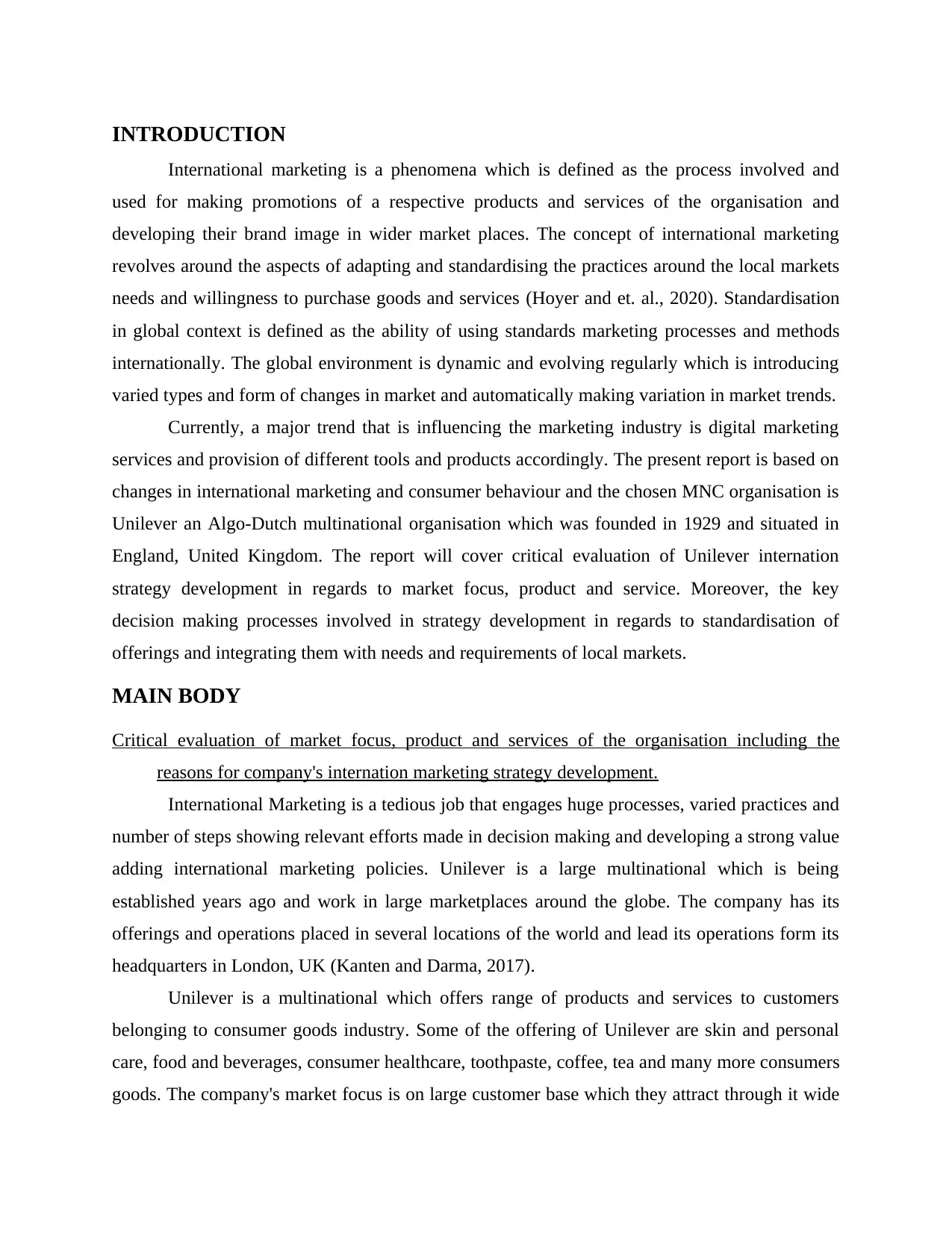
INTRODUCTION
International marketing is a phenomena which is defined as the process involved and
used for making promotions of a respective products and services of the organisation and
developing their brand image in wider market places. The concept of international marketing
revolves around the aspects of adapting and standardising the practices around the local markets
needs and willingness to purchase goods and services (Hoyer and et. al., 2020). Standardisation
in global context is defined as the ability of using standards marketing processes and methods
internationally. The global environment is dynamic and evolving regularly which is introducing
varied types and form of changes in market and automatically making variation in market trends.
Currently, a major trend that is influencing the marketing industry is digital marketing
services and provision of different tools and products accordingly. The present report is based on
changes in international marketing and consumer behaviour and the chosen MNC organisation is
Unilever an Algo-Dutch multinational organisation which was founded in 1929 and situated in
England, United Kingdom. The report will cover critical evaluation of Unilever internation
strategy development in regards to market focus, product and service. Moreover, the key
decision making processes involved in strategy development in regards to standardisation of
offerings and integrating them with needs and requirements of local markets.
MAIN BODY
Critical evaluation of market focus, product and services of the organisation including the
reasons for company's internation marketing strategy development.
International Marketing is a tedious job that engages huge processes, varied practices and
number of steps showing relevant efforts made in decision making and developing a strong value
adding international marketing policies. Unilever is a large multinational which is being
established years ago and work in large marketplaces around the globe. The company has its
offerings and operations placed in several locations of the world and lead its operations form its
headquarters in London, UK (Kanten and Darma, 2017).
Unilever is a multinational which offers range of products and services to customers
belonging to consumer goods industry. Some of the offering of Unilever are skin and personal
care, food and beverages, consumer healthcare, toothpaste, coffee, tea and many more consumers
goods. The company's market focus is on large customer base which they attract through it wide
International marketing is a phenomena which is defined as the process involved and
used for making promotions of a respective products and services of the organisation and
developing their brand image in wider market places. The concept of international marketing
revolves around the aspects of adapting and standardising the practices around the local markets
needs and willingness to purchase goods and services (Hoyer and et. al., 2020). Standardisation
in global context is defined as the ability of using standards marketing processes and methods
internationally. The global environment is dynamic and evolving regularly which is introducing
varied types and form of changes in market and automatically making variation in market trends.
Currently, a major trend that is influencing the marketing industry is digital marketing
services and provision of different tools and products accordingly. The present report is based on
changes in international marketing and consumer behaviour and the chosen MNC organisation is
Unilever an Algo-Dutch multinational organisation which was founded in 1929 and situated in
England, United Kingdom. The report will cover critical evaluation of Unilever internation
strategy development in regards to market focus, product and service. Moreover, the key
decision making processes involved in strategy development in regards to standardisation of
offerings and integrating them with needs and requirements of local markets.
MAIN BODY
Critical evaluation of market focus, product and services of the organisation including the
reasons for company's internation marketing strategy development.
International Marketing is a tedious job that engages huge processes, varied practices and
number of steps showing relevant efforts made in decision making and developing a strong value
adding international marketing policies. Unilever is a large multinational which is being
established years ago and work in large marketplaces around the globe. The company has its
offerings and operations placed in several locations of the world and lead its operations form its
headquarters in London, UK (Kanten and Darma, 2017).
Unilever is a multinational which offers range of products and services to customers
belonging to consumer goods industry. Some of the offering of Unilever are skin and personal
care, food and beverages, consumer healthcare, toothpaste, coffee, tea and many more consumers
goods. The company's market focus is on large customer base which they attract through it wide
⊘ This is a preview!⊘
Do you want full access?
Subscribe today to unlock all pages.

Trusted by 1+ million students worldwide
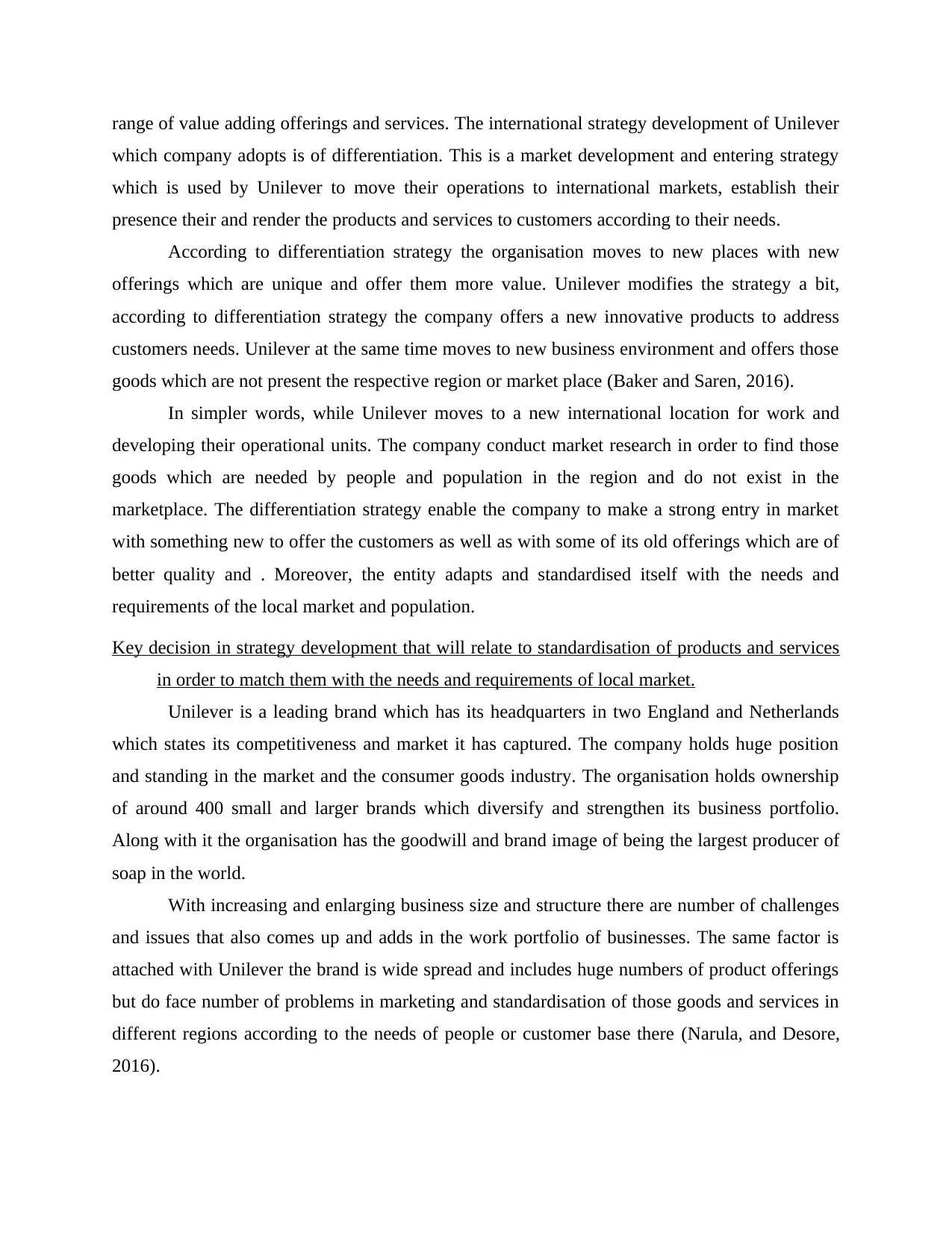
range of value adding offerings and services. The international strategy development of Unilever
which company adopts is of differentiation. This is a market development and entering strategy
which is used by Unilever to move their operations to international markets, establish their
presence their and render the products and services to customers according to their needs.
According to differentiation strategy the organisation moves to new places with new
offerings which are unique and offer them more value. Unilever modifies the strategy a bit,
according to differentiation strategy the company offers a new innovative products to address
customers needs. Unilever at the same time moves to new business environment and offers those
goods which are not present the respective region or market place (Baker and Saren, 2016).
In simpler words, while Unilever moves to a new international location for work and
developing their operational units. The company conduct market research in order to find those
goods which are needed by people and population in the region and do not exist in the
marketplace. The differentiation strategy enable the company to make a strong entry in market
with something new to offer the customers as well as with some of its old offerings which are of
better quality and . Moreover, the entity adapts and standardised itself with the needs and
requirements of the local market and population.
Key decision in strategy development that will relate to standardisation of products and services
in order to match them with the needs and requirements of local market.
Unilever is a leading brand which has its headquarters in two England and Netherlands
which states its competitiveness and market it has captured. The company holds huge position
and standing in the market and the consumer goods industry. The organisation holds ownership
of around 400 small and larger brands which diversify and strengthen its business portfolio.
Along with it the organisation has the goodwill and brand image of being the largest producer of
soap in the world.
With increasing and enlarging business size and structure there are number of challenges
and issues that also comes up and adds in the work portfolio of businesses. The same factor is
attached with Unilever the brand is wide spread and includes huge numbers of product offerings
but do face number of problems in marketing and standardisation of those goods and services in
different regions according to the needs of people or customer base there (Narula, and Desore,
2016).
which company adopts is of differentiation. This is a market development and entering strategy
which is used by Unilever to move their operations to international markets, establish their
presence their and render the products and services to customers according to their needs.
According to differentiation strategy the organisation moves to new places with new
offerings which are unique and offer them more value. Unilever modifies the strategy a bit,
according to differentiation strategy the company offers a new innovative products to address
customers needs. Unilever at the same time moves to new business environment and offers those
goods which are not present the respective region or market place (Baker and Saren, 2016).
In simpler words, while Unilever moves to a new international location for work and
developing their operational units. The company conduct market research in order to find those
goods which are needed by people and population in the region and do not exist in the
marketplace. The differentiation strategy enable the company to make a strong entry in market
with something new to offer the customers as well as with some of its old offerings which are of
better quality and . Moreover, the entity adapts and standardised itself with the needs and
requirements of the local market and population.
Key decision in strategy development that will relate to standardisation of products and services
in order to match them with the needs and requirements of local market.
Unilever is a leading brand which has its headquarters in two England and Netherlands
which states its competitiveness and market it has captured. The company holds huge position
and standing in the market and the consumer goods industry. The organisation holds ownership
of around 400 small and larger brands which diversify and strengthen its business portfolio.
Along with it the organisation has the goodwill and brand image of being the largest producer of
soap in the world.
With increasing and enlarging business size and structure there are number of challenges
and issues that also comes up and adds in the work portfolio of businesses. The same factor is
attached with Unilever the brand is wide spread and includes huge numbers of product offerings
but do face number of problems in marketing and standardisation of those goods and services in
different regions according to the needs of people or customer base there (Narula, and Desore,
2016).
Paraphrase This Document
Need a fresh take? Get an instant paraphrase of this document with our AI Paraphraser
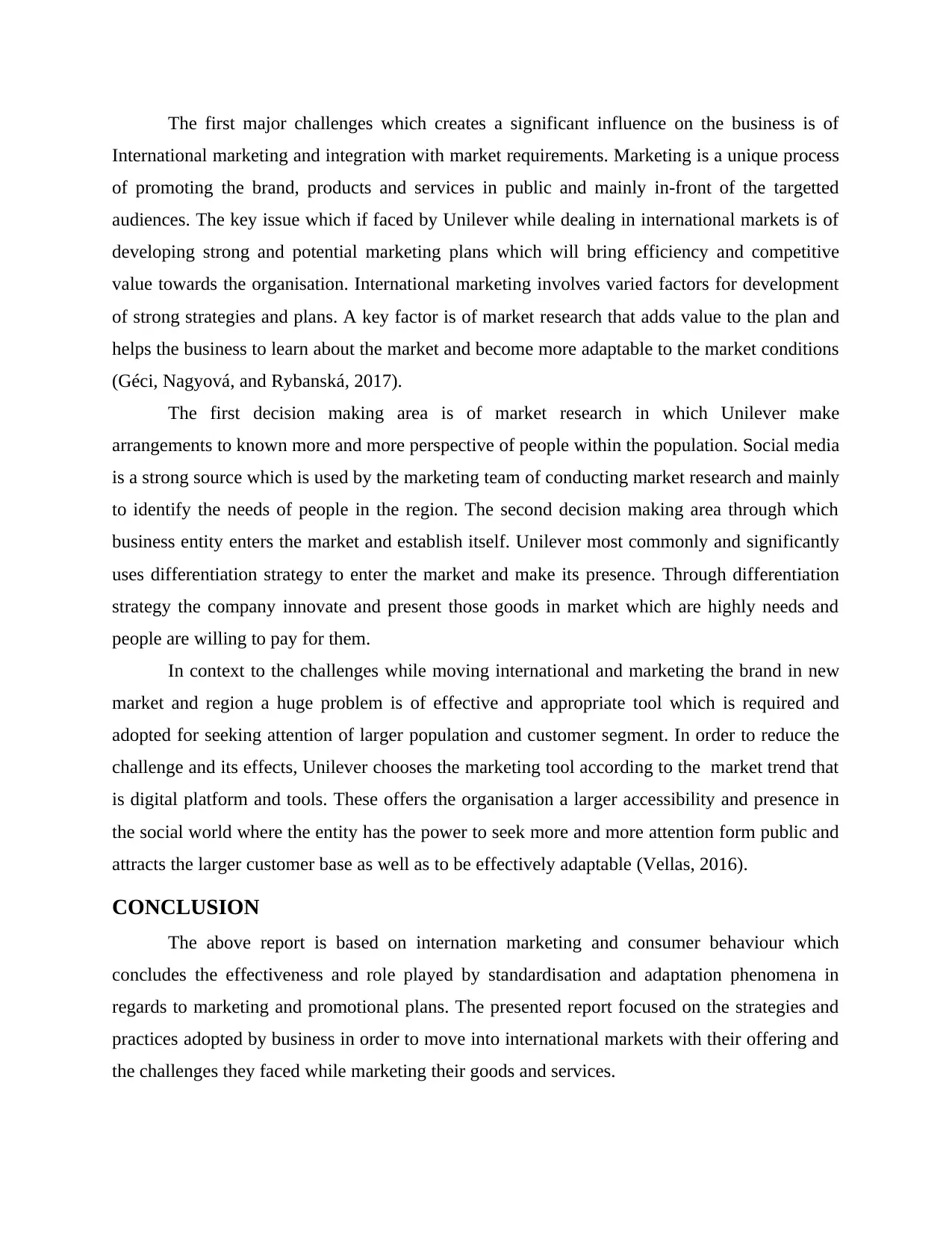
The first major challenges which creates a significant influence on the business is of
International marketing and integration with market requirements. Marketing is a unique process
of promoting the brand, products and services in public and mainly in-front of the targetted
audiences. The key issue which if faced by Unilever while dealing in international markets is of
developing strong and potential marketing plans which will bring efficiency and competitive
value towards the organisation. International marketing involves varied factors for development
of strong strategies and plans. A key factor is of market research that adds value to the plan and
helps the business to learn about the market and become more adaptable to the market conditions
(Géci, Nagyová, and Rybanská, 2017).
The first decision making area is of market research in which Unilever make
arrangements to known more and more perspective of people within the population. Social media
is a strong source which is used by the marketing team of conducting market research and mainly
to identify the needs of people in the region. The second decision making area through which
business entity enters the market and establish itself. Unilever most commonly and significantly
uses differentiation strategy to enter the market and make its presence. Through differentiation
strategy the company innovate and present those goods in market which are highly needs and
people are willing to pay for them.
In context to the challenges while moving international and marketing the brand in new
market and region a huge problem is of effective and appropriate tool which is required and
adopted for seeking attention of larger population and customer segment. In order to reduce the
challenge and its effects, Unilever chooses the marketing tool according to the market trend that
is digital platform and tools. These offers the organisation a larger accessibility and presence in
the social world where the entity has the power to seek more and more attention form public and
attracts the larger customer base as well as to be effectively adaptable (Vellas, 2016).
CONCLUSION
The above report is based on internation marketing and consumer behaviour which
concludes the effectiveness and role played by standardisation and adaptation phenomena in
regards to marketing and promotional plans. The presented report focused on the strategies and
practices adopted by business in order to move into international markets with their offering and
the challenges they faced while marketing their goods and services.
International marketing and integration with market requirements. Marketing is a unique process
of promoting the brand, products and services in public and mainly in-front of the targetted
audiences. The key issue which if faced by Unilever while dealing in international markets is of
developing strong and potential marketing plans which will bring efficiency and competitive
value towards the organisation. International marketing involves varied factors for development
of strong strategies and plans. A key factor is of market research that adds value to the plan and
helps the business to learn about the market and become more adaptable to the market conditions
(Géci, Nagyová, and Rybanská, 2017).
The first decision making area is of market research in which Unilever make
arrangements to known more and more perspective of people within the population. Social media
is a strong source which is used by the marketing team of conducting market research and mainly
to identify the needs of people in the region. The second decision making area through which
business entity enters the market and establish itself. Unilever most commonly and significantly
uses differentiation strategy to enter the market and make its presence. Through differentiation
strategy the company innovate and present those goods in market which are highly needs and
people are willing to pay for them.
In context to the challenges while moving international and marketing the brand in new
market and region a huge problem is of effective and appropriate tool which is required and
adopted for seeking attention of larger population and customer segment. In order to reduce the
challenge and its effects, Unilever chooses the marketing tool according to the market trend that
is digital platform and tools. These offers the organisation a larger accessibility and presence in
the social world where the entity has the power to seek more and more attention form public and
attracts the larger customer base as well as to be effectively adaptable (Vellas, 2016).
CONCLUSION
The above report is based on internation marketing and consumer behaviour which
concludes the effectiveness and role played by standardisation and adaptation phenomena in
regards to marketing and promotional plans. The presented report focused on the strategies and
practices adopted by business in order to move into international markets with their offering and
the challenges they faced while marketing their goods and services.
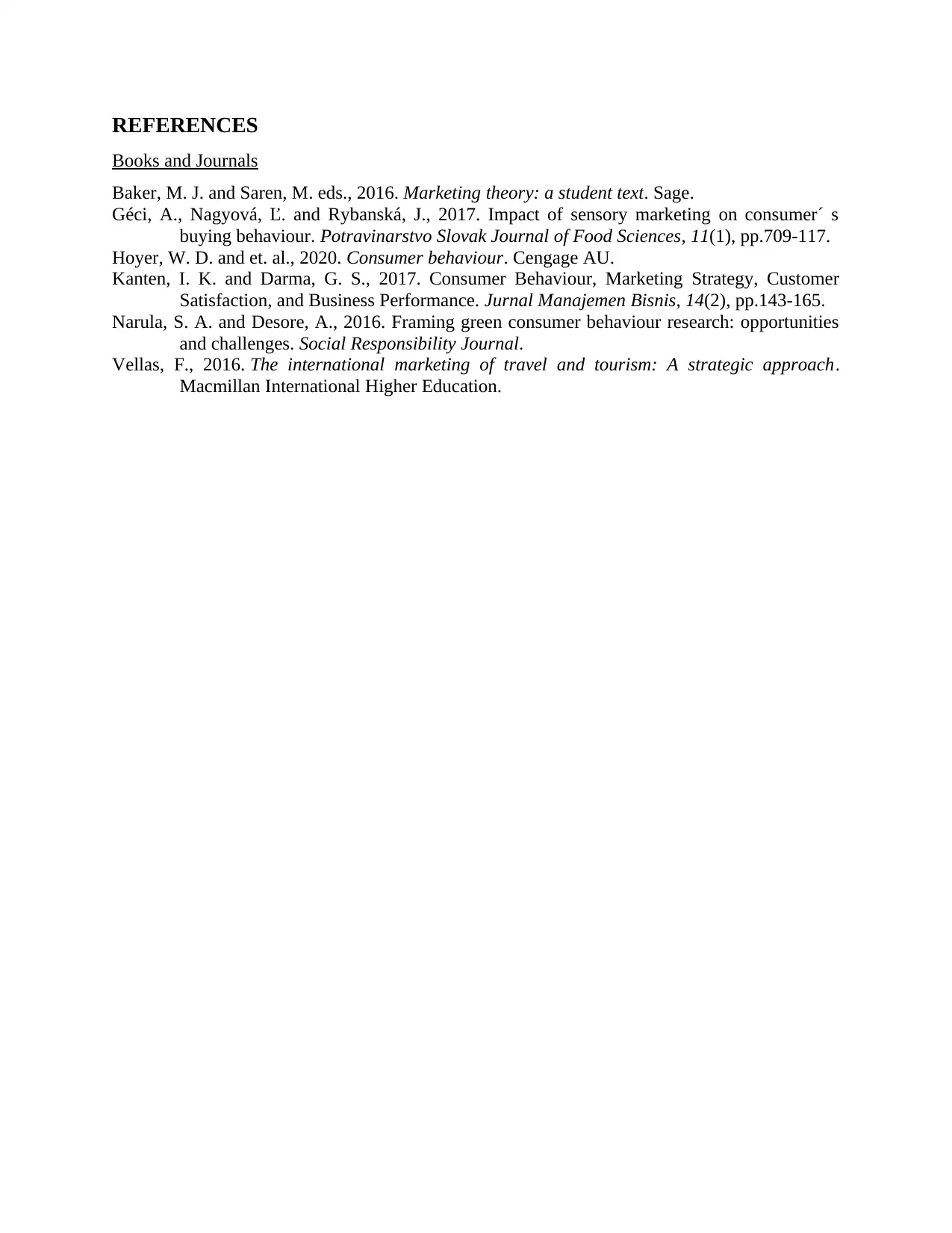
REFERENCES
Books and Journals
Baker, M. J. and Saren, M. eds., 2016. Marketing theory: a student text. Sage.
Géci, A., Nagyová, Ľ. and Rybanská, J., 2017. Impact of sensory marketing on consumer´ s
buying behaviour. Potravinarstvo Slovak Journal of Food Sciences, 11(1), pp.709-117.
Hoyer, W. D. and et. al., 2020. Consumer behaviour. Cengage AU.
Kanten, I. K. and Darma, G. S., 2017. Consumer Behaviour, Marketing Strategy, Customer
Satisfaction, and Business Performance. Jurnal Manajemen Bisnis, 14(2), pp.143-165.
Narula, S. A. and Desore, A., 2016. Framing green consumer behaviour research: opportunities
and challenges. Social Responsibility Journal.
Vellas, F., 2016. The international marketing of travel and tourism: A strategic approach.
Macmillan International Higher Education.
Books and Journals
Baker, M. J. and Saren, M. eds., 2016. Marketing theory: a student text. Sage.
Géci, A., Nagyová, Ľ. and Rybanská, J., 2017. Impact of sensory marketing on consumer´ s
buying behaviour. Potravinarstvo Slovak Journal of Food Sciences, 11(1), pp.709-117.
Hoyer, W. D. and et. al., 2020. Consumer behaviour. Cengage AU.
Kanten, I. K. and Darma, G. S., 2017. Consumer Behaviour, Marketing Strategy, Customer
Satisfaction, and Business Performance. Jurnal Manajemen Bisnis, 14(2), pp.143-165.
Narula, S. A. and Desore, A., 2016. Framing green consumer behaviour research: opportunities
and challenges. Social Responsibility Journal.
Vellas, F., 2016. The international marketing of travel and tourism: A strategic approach.
Macmillan International Higher Education.
⊘ This is a preview!⊘
Do you want full access?
Subscribe today to unlock all pages.

Trusted by 1+ million students worldwide
1 out of 6
Related Documents
Your All-in-One AI-Powered Toolkit for Academic Success.
+13062052269
info@desklib.com
Available 24*7 on WhatsApp / Email
![[object Object]](/_next/static/media/star-bottom.7253800d.svg)
Unlock your academic potential
Copyright © 2020–2026 A2Z Services. All Rights Reserved. Developed and managed by ZUCOL.





